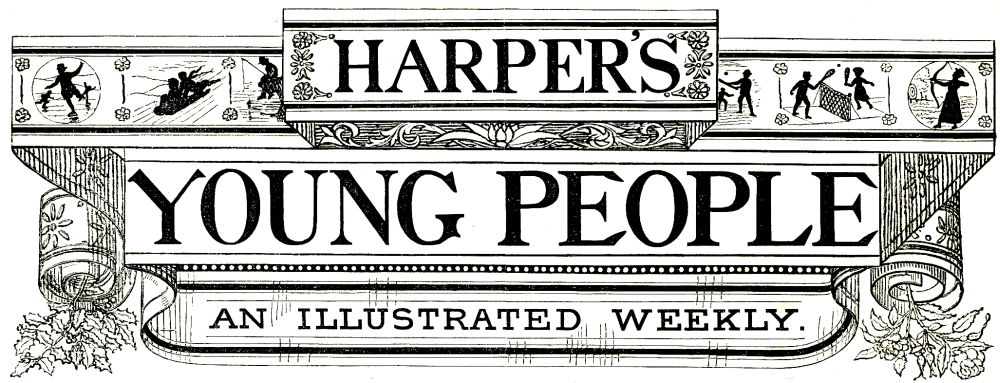
Project Gutenberg's Harper's Young People, November 18, 1879, by Various
This eBook is for the use of anyone anywhere at no cost and with
almost no restrictions whatsoever. You may copy it, give it away or
re-use it under the terms of the Project Gutenberg License included
with this eBook or online at www.gutenberg.org
Title: Harper's Young People, November 18, 1879
An Illustrated Weekly
Author: Various
Release Date: February 26, 2009 [EBook #28196]
Language: English
Character set encoding: ISO-8859-1
*** START OF THIS PROJECT GUTENBERG EBOOK HARPER'S YOUNG PEOPLE, NOV 18, 1879 ***
Produced by Annie McGuire
| THE TOURNAMENT. |
| THE BRAVE SWISS BOY. |
| A GIGANTIC JELLY-FISH. |
| THAT EARTHQUAKE! |
| THE DOLLS' WEDDING. |
| THE STORY OF A PARROT. |
| WIGGLES. |

| Vol. I.—No. 3. | Published by HARPER & BROTHERS, New York. | Price Four Cents. |
| Tuesday, November 18, 1879. | Copyright, 1879, by Harper & Brothers. | $1.50 per Year, in Advance. |
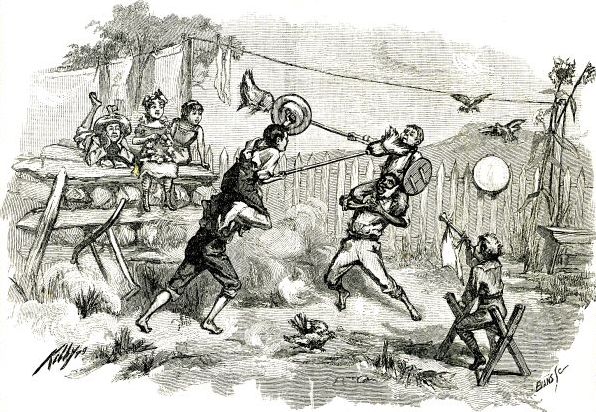 THE TOURNAMENT.—Drawn by James E. Kelly.
THE TOURNAMENT.—Drawn by James E. Kelly.
Great rivalry arose once between James and Henry, two school-mates and warm friends, and all on account of a pretty girl who went to the same school. Each one wanted to walk with her, and carry her books and lunch basket; and as Mary was a bit of a coquette, and showed no preference for either of her admirers, each tried to be the first to meet her in the shady winding lane that led from her house to the school. At last they determined to decide the matter in the old knightly manner, by a tournament. Two stout boys consented to act as chargers, and the day for the meeting was appointed.
It was Saturday afternoon, a half-holiday, when the rivals met in the back yard of Henry's house, armed with old brooms for lances, and with shields made out of barrel heads. The chargers backed up against the fence, the champions mounted and faced each other from opposite sides of the yard. The herald with an old tin horn gave the signal for the onset. There was a wild rush across the yard, and a terrific shock as the champions met. James's lance struck Henry right under the chin, and overthrew him in spite of his gallant efforts to keep his seat.
The herald at once proclaimed victory for James; and Henry, before he was allowed to rise from the ground, was compelled to renounce all intention of walking to school with Mary in the future.
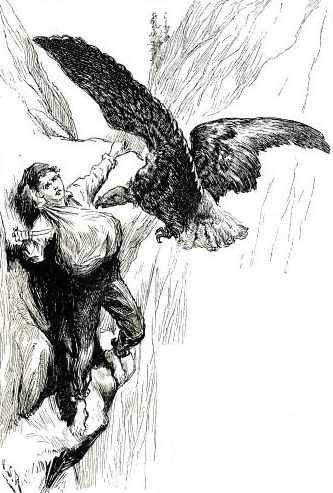 "WALTER AIMED TWO OR THREE BLOWS AT THE CREATURE'S
BREAST."
"WALTER AIMED TWO OR THREE BLOWS AT THE CREATURE'S
BREAST."
In this dreadful crisis, Walter pressed as hard as he could against the rocky crag, having but one hand at liberty to defend himself against the furious attack of the bird. It was quite impossible for him to get at his axe, and the force with which he was assaulted caused him nearly to let go his hold. He tried to seize the vulture's throat and strangle it; but the bird was too active, and made all such attempts perfectly useless. He could scarcely hope to continue such a dangerous struggle [Pg 18]much longer. He was becoming faint from terror, and his left hand was fast growing benumbed with grasping the rock. He had almost resigned himself to his fate, and expected the next moment to be dashed to pieces on the field of ice beneath. Suddenly, however, he recollected his pocket-knife, and a new ray of hope dawned. Giving up the attempt to clutch at the furious bird, he drew the knife out of his pocket, and opened it with his teeth, and aiming two or three blows at the creature's breast, he found at last that he had been successful in reaching some mortal part. The fluttering of the wings ceased, and the dying bird stained the virgin snow with its blood on the ice-field below. Walter was saved; there was no other enemy now to fear; his life was no longer in danger; but his energies were taxed to the utmost, and it was well for him that the terrible contest had lasted no longer.
Pale, trembling in every limb, and spattered with the vulture's blood as well as that which trickled from the many wounds he had received, the valiant young cragsman sank helplessly to the ground, where he lay for some minutes, paralyzed with the terrible exertion he had gone through. At length, however, he so far recovered himself as to be able to continue his fatiguing and dangerous journey, and soon succeeded in reaching the spot where he had left his jacket, shoes, and alpenstock. Having gained a place of safety, he poured forth his thanks to God for delivering him from such great danger, and began to bind up his wounds, which for the first time were now paining him. When this was accomplished in a rough and ready sort of way, he had a peep at the trophies in his bag, whose capture had been attended with such adventurous danger, and with the aid of his alpenstock succeeded in getting the dead body of the old bird, which he found had been struck right to the heart. But his knife he could not recover, so concluded that he must have dropped it after the deadly encounter.
"That doesn't matter much," said he to himself, as he looked at the size of the bird. "It is a good exchange; and if I give the stranger the old bird with the young ones, I dare say he will give me another knife. What a splendid creature! Fully four feet long, and the wings at least three yards across. How father will open his eyes when he sees the dead Lämmergeier—and the Scotch gentleman too!"
Tying the legs of the bird together with cord which he had fortunately brought, he slung it across his shoulder to balance the weight of the bag, and then started on his journey across the glacier, the foot of which he soon reached, and was then within hailing distance of the hotel where the stranger was residing.
It was a good thing that he had not been kept longer away, for the sun was beginning to set by the time he reached the valley, and only the highest peaks were lit up by its departing glory. Tired and hungry, Walter was thankful to find himself once more at the door of the inn, where there was the same crowd of travellers, guides, horses, and mules he had seen in the morning. His appearance had attracted general attention as he descended the last hill leading to the hotel.
"Why, I declare it's Watty Hirzel!" exclaimed one of the guides. "He was here this morning, and I declare he's got a young eagle hanging across his shoulder."
"Say an old vulture, Mohrle, and you'll be nearer the mark," replied the lad in a cheerful tone and with sparkling eyes; for he felt so proud of the triumph he had achieved that all fatigue seemed to be forgotten. "An old vulture, Mohrle, and a splendid fellow into the bargain! I've got the young ones in my bag here."
"You're a pretty fellow!" said another guide, with a sneer. "I suppose you mean to tell us that you've killed the old bird and carried off the young ones?"
"Yes, that is just what I mean to tell you," replied the boy, smiling, and paying no attention to the sneer of the other. "I've done it all alone. I took the youngsters out of the nest, and had a regular fight with the old ones afterward. I brought one of them home; but the other you will find somewhere in the Urbacht Valley, if you like to go and look for it."
"I think the lad speaks the truth," said Mohrle, gazing at Walter with astonishment and respect.—"You've had a long journey, my boy, and you're covered with blood. Did the old vulture hurt you?"
"Yes, the brute stuck his claws into me, and if I hadn't had a sharp knife in my pocket, it would have been all over with me. But let me through, for I want to take the young birds up stairs to a gentleman here."
Mohrle and the other guides who had surrounded the courageous boy would gladly have detained him longer to hear all the particulars of his daring adventure; but he pressed through the crowd, promising to tell them all about it afterward, and made his way up to the room occupied by Mr. Seymour, who received him with as much astonishment as the guides had done.
"There, Sir," exclaimed Walter, as he took the young vultures out of his bag and placed them on the floor—"there are the birds you wanted; and here is one of the old ones, which I brought with me from the Engelhorn. But you must let them have something to eat—the live ones, I mean; for they've had nothing for nearly a whole day, and are squealing for hunger."
Mr. Seymour stood for a moment speechless. He was filled with delight at the sight of the young birds he had so long wished for, but was at the same time dumfounded at the courage and honor of the young mountaineer.
"Is it possible?" he exclaimed at last. "Have you really ventured to risk your life, although I told you that I didn't want the birds?"
"Well, Sir, I know you said so; but I saw by your face that you would like to have them all the same; and so, as you had been so kind to me, I didn't mind running a little risk to please you, although it was hard work. So there they are; but you mustn't forget to feed them, or they will be starved to death before morning."
"Oh, we will take good care that they don't die of hunger," replied Mr. Seymour, ringing the bell. "I think, as you take such a warm interest in the welfare of the birds, you must feel rather hungry yourself. So sit down and have something to eat, and then you can tell me all about your adventure."
When the waiter came, some raw meat was ordered for the fledgelings—which were presently safely housed in the stable-yard—and a good dinner for Walter, who, aided by Mr. Seymour's encouraging remarks, did justice to a meal the like of which he had never before seen—a finale which was to him by far the most agreeable part of his day's work. Then the lad commenced, in simple language, to describe all that he had gone through, which, while it pleased his host thoroughly, caused him to feel still greater surprise and admiration at his young friend's unaffected bravery and presence of mind.
"You have performed a brave and daring action," said he, when Walter had finished his story. "I should call it a rash and fool-hardy adventure, had you not been actuated by a noble motive in carrying it out. A feeling of gratitude inspired you, and therefore God was with you, and preserved you. But tell me, boy, how is it that you had courage and resolution enough to expose yourself to such a frightful risk?"
"Well, Sir, I can't say," replied Walter, thoughtfully. "All I know is that I was determined to do it, and that is enough to help one over a great many hard things. At the very last, when I was attacked by the second vulture, and might have been easily thrown down the rocks, the thought came into my mind that you must and ought to have the birds; and then I recollected the knife in my pocket, which settled the business. Yes; that was it, Sir. You had been so generous to me, that I made up my mind to[Pg 19] fight it out; and there's the end of it. I couldn't think of being ungrateful after so much kindness."
"Well, my lad, you have proved most clearly that you have a thankful heart and a cool and determined head," said Mr. Seymour, not without emotion. "Maintain these characteristics, and use them always for good and noble purposes, and I am sure you will find the end of every adventure as satisfactory as this has been to-day. I owe you a new knife and a suit of clothes; for the old vulture that has used you so badly was not in our bargain this morning. But we will talk about that another time. You had better go home now, for I think your father will begin to feel anxious about you, as it is getting late. I will come and see you in the morning."
Walter left the room in great glee. He stopped a few minutes in the court-yard to tell the impatient guides what he had gone through, and then hurried home as fast as he could, where he found his father waiting for him with some impatience. "Everything is settled, father!" he exclaimed, as he clasped him round the neck. "We shall get our cow back again now; for I've got the money, and Neighbor Frieshardt can't keep her any longer. I've brought it back with me from the Engelhorn."
The peasant could scarce believe the hurried words of the excited boy, and was afraid his head was turned, until Walter opened the little cupboard where he had put the money, and laid the two bright gold pieces on the table. There was no longer any room for doubt; and the poor man's eyes sparkled with delight as he looked at the sum which was just sufficient to pay his debt and rescue the cow from the hands of his neighbor.
"But how did you come by all this money, Watty?" he inquired. "I hope you have got it fairly and honestly?"
"Yes, quite honestly, father," replied the boy, with an open and exultant smile.
"Well, tell me— But no; I must go and get Liesli out of prison without a moment's delay. Come along with me to Neighbor Frieshardt's, Watty."
Away went the happy pair to the neighboring farm-house; and although Frieshardt looked sullen and displeased when Toni Hirzel laid the gold pieces on the table, it was no use for him to offer any resistance; so he went rather sulkily to the cow-house, and let out the captive animal, which was followed home by the peasant and his proud son, and got a capital supper in her old quarters. When this important business was accomplished, Walter repaired with his father to the little cottage again, and for the third and last time that day related all the adventures he had gone through in his hunt for the vulture's nest.
"Thanks be to God that He has watched over you, and brought you safely home again!" exclaimed the father, who had listened with a beating heart to his son's story. "It is a great blessing that we have got the money, for my cousin couldn't lend me any. But now promise me faithfully, youngster, that you will never go on such a dangerous errand again without speaking to me about it. It is a perfect miracle that you have come back alive! We have good reason to be thankful as long as we live that you didn't miss your footing or get killed by that savage vulture. But what I wonder most at is that you could muster up the pluck for such a risky business. It was too dangerous."
"Well, father, I did it for you, and so that we could get poor Liesli back again," replied the boy. "We could never have got on without the cow; and as the Scotch gentleman had been so kind to me, I made up my mind to get the young birds for him, and thought nothing about the danger I ran, if I could only accomplish my undertaking."
"I am very glad you have been so successful," said his father; "but never forget that your success is owing altogether to God's help, and don't forget to thank Him with all your heart for His watchful care."
"I'll be sure not to forget that, father," was the boy's reply. "I know that the very greatest courage is of no use without God's blessing; and I prayed for help before I set out, and several times afterward."
"That was right, Watty, my son. Never forget God, and He will always be with you, and protect you all your life long. And now, good-night, dear boy."
"Good-night, father," replied Walter, heartily; and both retired to their humble beds, and were soon wrapped in deep and healthful slumber.
Few excursions can be proposed more acceptable to young folks than going a-fishing, and perhaps the most delightful sort of fishing is to be had by accompanying some old fisherman out into the broad ocean.
There are many circumstances that contribute to make a day's sport of this kind more enjoyable than pond or river fishing, and not the least of these consists in the wonderful variety of the creatures to be caught.
In our inland streams and lakes in any given locality the kinds of fish to be caught are well known, and, comparatively speaking, there are not many different sorts; but in ocean fishing the oldest fisherman, and those most accustomed to the sorts of fish generally found in their fishing grounds, every once in a while happen upon creatures the likes of which have seldom, perhaps never, been seen before. Only a short time since a Nantucket fisherman, rowing slowly along, buried the prow of his boat in some partly yielding substance that brought him to a stand-still. Somewhat startled, he went forward, oar in hand, to find his little craft imbedded in the body of an enormous jelly-fish, the largest ever seen. The soft and yielding body of the creature offered so little resistance to his oar when he tried to push off, and he saw himself so hopelessly entangled in the mass of slime and tentacles, that, instead of attempting to free himself, he determined to tow it ashore, which he did by passing a sail-cloth under its body and rowing slowly homeward.
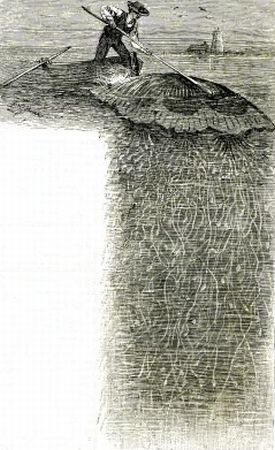 THE CAPTURE.
THE CAPTURE.
Of course the rough encounter with the boat had considerably mutilated the jelly-fish, and torn away portions of the long thread-like processes or tentacles that hang from the central mass; yet these, when the creature was laid along the sand of the ocean beach, measured over two hundred feet in length, and it is conjectured that, uninjured and stretched to their utmost length, they could not have been less than three hundred feet long. The great shield-like body of the animal was found to be over nine feet in diameter, two feet more than the largest heretofore known, which is described by Professor Agassiz, who measured it while it was floating lazily on the surface of the water. This specimen was so large that the professor feared his account of it might be considered exaggerated.
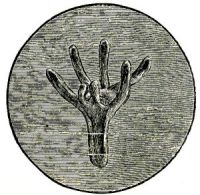 HYDROID FROM WHICH THE JELLY-FISH GROWS.
HYDROID FROM WHICH THE JELLY-FISH GROWS.
The monster when alive looks as much as anything like an immense circular plate or dish of glass floating bottom upward on the sea. The color of the body is a brownish-red, with a rather broad margin of creamy white edged with blue, while the tentacles—pink, blue, brown, and purple—hang like skeins of colored glass threads from the under parts of the shield. Very beautiful are these threads, glistening with a silky lustre beneath the waves, but they are extremely dangerous, too. Each of these threads, in fact, contains myriads of cells, in each one of which is coiled up, ready to be darted forth on contact with any living substance, a whip-like lance finer than the finest cambric needle. Millions of these stings entering at once cause a sensation like that of a violent electric shock, paralyzing and often killing the creature with which they come in contact.
This gigantic creature grows from the small one, called a hydroid, represented in the small cut. You see the hydroid does not in the least resemble a jelly-fish. Perhaps the strangest thing about these wonderful lumps of animated jelly is that their young are not jelly-fishes at all, but an entirely different sort of animals. Sometimes they take the shape of a pile of platters, which finally separate and become individual jelly-fish; sometimes they grow into living plants which bear eggs like fruit, which eggs hatch and finally become jelly-fish. No fairy tale can afford instances of transformations so surprising as do these animals—more like animated bubbles than anything else to which they can be compared; transparent and exhibiting the most brilliant colors, they dissolve away when stranded so completely that no trace of their substance seems to remain.[Pg 20]
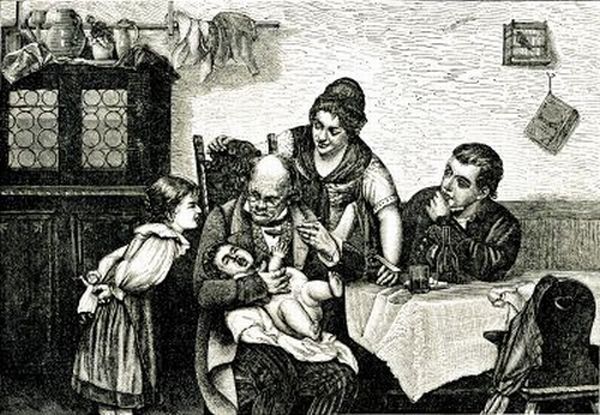 THE FIRST DROP OF BITTERNESS.
THE FIRST DROP OF BITTERNESS.
Come, little one, open your mouth!
I know it is bitter to drink;
But if you'll stop squirming and squalling,
You'll have it all down in a wink.
The poor little baby is sick,
And this is to cure the bad pain;
So swallow the medicine, darling,
And soon you can frolic again.
How glad should we be, who are older,
And have bitter burdens to bear,
To find out some wonderful doctor
With cures for each sorrow and care!
At the Bottom of a Mine.—Years ago some Welsh miners, in exploring an old pit that had been long closed, found the body of a young man dressed in a fashion long out of date. The peculiar action of the air of the mine had been such as to preserve the body so perfectly that it appeared asleep rather than dead. The miners were puzzled at the circumstance; no one in the district had been missed within their remembrance; and at last it was resolved to bring the oldest inhabitant—an old lady, long past her eightieth year, who had lived single in the village the whole of her life. On being brought into the presence of the body, a strange scene occurred: the old lady fell on the corpse, kissed and addressed it by every term of loving endearment, couched in the quaint language of a by-gone generation. "He was her only love; she had waited for him during her long life; she knew that he had not forsaken her."
The old woman and the young man had been betrothed sixty years before. The lover had disappeared mysteriously, and she had kept faithful during that long interval. Time had stood still with the dead man, but had left its mark on the living woman. The miners who were present were a rough set, but very gently, and with tearful eyes, they removed the old lady to her house, and the same night her faithful spirit rejoined that of her long-lost lover.
Did you ever play in a cellar? I don't mean a cellar with a smooth floor, and coal-bins, and a big furnace, and shelves with jars of nice jam on them and glasses of jelly; I've been in that kind of a cellar too—I like quince jelly the best; it's first rate spread on bread and butter—but I'm talking of another kind of a cellar, one with the house all taken away, and only a big brick chimney left in the centre, with the top knocked off of that, and bricks and pieces of stone and chunks of mortar scattered all round; with berry bushes growing in one corner, and wild vines growing all around the edges.
There was just such a cellar as this where I used to live, and Kate and Teddy Ames, who lived in the next house, used to come over and play in the cellar with Billy and me.
Billy was my brother, eight years old, and the best fellow to play with you ever saw, because he was always "sperimentin"—that's what mother called it, and it meant trying to do things.
Billy knew a great deal more than all the rest of the boys in our school, and he was very fond of reading, but it didn't make him stupid a bit, for whatever he read about he always wanted to go right off and see if he could do it too. This made great fun for us, and got Billy into lots of scrapes.
When he tried to do anything like what he had read about, he never would be satisfied until he could do it all exactly as the reading said it was. So when we had read Robinson Crusoe together—I think Billy knew it all by heart as well as he knew the table of sevens in the multiplication table—he said, "Now let's play Robinson Crusoe." First he called the old open cellar Crusoe's cave, and scooped out a place between some stones and made it clean, and I braided a little mat and a curtain out of some long grass for it, and there he put his old copy of Robinson Crusoe, and for days and days, after school was out, and in vacation, we played Robinson Crusoe together.
Kate was a parrot, and wanted a great deal of cracker, Teddy was a goat, and I was the dog and "man Friday" by turns. We walked about in the cellar pretending to look for the print of naked feet, Billy going in front carrying a rusty old broken musket we had found in the garret, and a piece of rubber hose (Billy always could find or make anything we wanted) for a telescope, which he used to look through to see if there were any savages in sight when he climbed up to the edge of the cellar.
The cellar was really an island, just like Robinson Crusoe's; for Billy and Teddy had digged a ditch all round it, and filled it with water; but it was a very trying sort of an ocean, 'cause we had to fill it up every morning.
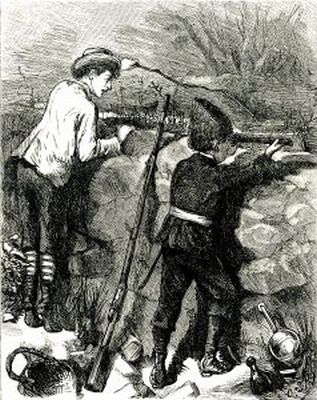 BILLY WATCHING FOR SAVAGES.—Drawn by C. S. Reinhart.
BILLY WATCHING FOR SAVAGES.—Drawn by C. S. Reinhart.
Teddy, who could whittle nicely, made some little canoes, and when Billy was looking through the hose for savages, it was Teddy's part to poke the canoes with a long stick like a fish-pole, so they would float right in front of Billy's hose. Then Billy would scramble down the wall, and come running to us 'round behind the chimney, and tell us to lie very still, for there were seven canoes full of cruel savages sailing for the island.
Then we would all creep close to the chimney on the shady side, and not go out for two weeks, which meant about fifteen minutes (Billy counted seven minutes to a week), and we liked this part of Robinson Crusoe very much indeed, 'cause then Billy would give us what he called "rations"—nice sugary raisins, dried beef, and seed cookies, which he said were cocoa-nuts given to him by monkeys that lived in tall trees in another part of the island, where we should go with him some time when he was sure the savages had left.
Oh, if you never played Robinson Crusoe, you can't think what fun we had playing it, and we played almost the whole book through, sometimes one part, and sometimes another, and whatever part we played, Billy tried to have it just as near like what the book said as it could be made without a real ship, a real ocean, and a real island; and he was so in earnest that it seemed real to me, and I used to feel shivery and scared when he cried out that the savages were coming.
There were all sorts of nice rubbishy things in the cellar to play with, 'cause everything that[Pg 21] got broken or too old for use in the house—or "the wreck," as Billy called it—got thrown out into the old cellar: empty fruit cans, broken dishes, leaky old pans and dippers, parts of broken chairs and broken looking-glasses, and old kettles and frying-pans; bits of shingles, old nails, and piles and piles of clam and oyster shells; and Billy knew the minute he saw a thing what to do with it.
Kate and I helped with pieces of muslin, ribbon, and old calico, so that every day the little square place behind the chimney was more and more like Robinson Crusoe's own house on the real island.
One day papa stopped and looked at us as he was going by, and said he was afraid it wasn't a safe place for us, the old chimney might tumble down on us, or we might cut our feet on some of the broken things; but mother only smiled and said, "Oh, do let the children be happy." I guess she was jolly to play with when she was a little girl.
She often came out, or sent Biddy out with a nice turn-over, or a plate of hot ginger cookies; and after papa spoke about the chimney, she climbed down into the cellar, and went over and felt the chimney all round to see if it was quite firm. Once we coaxed her to stay with us during the two weeks while the savages were on the island. Billy, who liked to play just what was in the book, said at first that Robinson Crusoe didn't ever have his mother with him, but he "guessed the man who wrote the story would have put that in if he had known what larks it was."
But one day something happened that stopped our playing Robinson Crusoe or anything else for a long time. Mother had sent Billy on an errand a long way off, Kate Ames was sick, and Teddy had to stay at home to amuse her, and I was in the house, in the sitting-room with mother.
The morning had been very pleasant and warm, and though I wished we were all together in the cellar at play, I was quite contented with a book called Beechnut, a Franconia story, and I was thinking that Beechnut was almost just like Billy. Mother laid down her sewing, and went out of the room, patting my cheek with her kind hand as she passed, to tell Biddy something about dinner.
In a few minutes it grew so dark that I looked out of the window to see what made it, and saw the sky covering with a big black cloud that unrolled ever so fast, and the wind began to blow very hard, and the trees bent and turned over the white sides of their leaves in it. If Billy had been at home I should have gone out with him to run in the wind, because it feels so pleasant on my cheeks and in my hair, just as flowing water looks. It grew darker, began to rain, and the wind grew louder, with a queer sound; but I could see to read, and I got so interested in Beechnut that, though I saw out of the side of my eye some one go by the window, I did not really think about it, but kept on reading till I heard papa's voice in the next room, and heard mamma say:
"I'm so glad you're safe in the house; but where can Billy be? I sent him to Morton's, but he ought to have been home an hour ago. It's a perfect hurricane!"
"Oh, he'll do," said papa; "he's under cover somewhere, but—"
I couldn't hear any more, for just then the windows rattled; the floor shook so I could hardly keep my seat. There was an awful roar of wind, a crackling sound in the walls, a crash outside as if a load of coal were being tumbled into the bin, and the pretty vases on the mantel fell and broke to pieces on the floor. I ran as well as I could, and caught hold of papa. He held mamma's hands. She was white, and looked so strange. It frightened me more than all the rest, and I couldn't keep from crying.
"Hurricane! my dear," I heard papa say; "it's an earthquake shock. I do wish we knew where Billy is."
Then I remembered, and I said, "Oh, mamma, don't be frightened; Billy came in half an hour ago."
But when papa, mamma, and I—Biddy coming after us, with her apron up over her face, and crying, "Och, what a nize!" and "God save us!" every step—went from room to room, we didn't find Billy.
"Maggie, are you sure you saw him?" said mamma, stopping me, with both her hands on my shoulders, at the head of the stairs—"are you sure?"
"Oh yes; he went by the window when I was reading in Beechnut about where Phonny—"
"The cellar!" cried mamma, and drew in her breath just like the sound of the wind.
Already the clouds had rolled away; the storm was over; and Biddy, who had been standing at the back stairway window, cried out, "Feth, mem, an' av me two eyes don't be afther desavin' me, the owld chimbley's blowed over, an' niver a brick lift o' the poor childer's foine play-house."
In a moment mamma was down the stairs; papa could not hold her nor catch up with her, and we all ran after her to the edge of the cellar. Our pretty Robinson Crusoe house was all ruined. Dirt, sticks, stones, and everything that had lain about the yard were just as if they had been swept with a big broom into the cellar; and the big chimney—all blown to pieces now—helped to fill up the cave.
Mother was crying dreadfully, and I cried too. She went right down on her knees, and began picking up and throwing out the bricks. Papa could not stop her; she only said, in a voice that did not sound like mamma's voice at all, "My Billy's here."
It was so dreadful I can't remember exactly all about it; but papa got Mr. Ames and one or two other men, and after a while mamma caught hold of and kissed a little coat sleeve, and a hand so white it didn't look one bit like Billy's. Mamma thought Billy was dead, and she sat down very still, and did not try to work any more, but held the hand until the men had lifted every bit off from Billy; and she went beside them when he was carried in. He was not dead, he was only stunned; but his arm, the one mamma found, was broken in three places. He had a great deal of pain before his arm began to heal; but he never made a bit of fuss about it, and he never said anything to papa or mamma about the cellar, and how it happened, except just once when mamma asked him a question, and he told her he had gone into the cellar to cover up some of the things if he could. But the first time we were left alone together he called me close to him.
"The cave's all spoiled, I s'pose?" said he.
"Oh yes. Papa had it filled up right away."
Billy didn't say anything for a little while, but held on to my hand, and looked so pleased, I wondered at it. Then he said:
"I'm sorry for all the trouble I made them; but I don't mind telling you, Maggie, because you're a real first-class girl, and won't tattle. I was always bothering about how we could have the earthquake. We played everything else of Robinson Crusoe's, you know, but I couldn't see how to get that up." Billy was so eager that he forgot, and tried to lean on his lame elbow. That made him twist his face, but after a moment he smiled again. "Oh, Maggie," said he, "if that cellar had been filled up before we had that earthquake, I never should have been satisfied; but now, you see, I'm even with old Robinson!"[Pg 22]
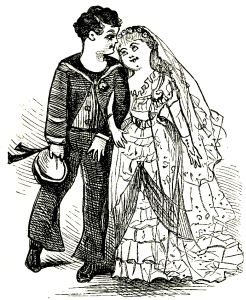
I am so glad that the sunshine has driven the clouds away,
For my dolly, my darling dolly, is going to be married to-day.
She has had a great many suitors—a dozen, I do declare—
And only last week, Wednesday, she refused a millionaire.
Sophie Read is his mother; she thought we'd feel so grand
That a doll with a diamond stud should offer my child his hand.
But Rose cares little for money, and she's given her heart away
To Charlie, the gallant sailor, who will make her his bride to-day.
Nora has made her a bride-cake with frosting as white as snow,
And I wove her bridal wreath from the tiniest flowers that blow;
And brother Harry has promised (he's ever so kind, I'm sure)
To lend them his beautiful yacht when they sail on their wedding tour.
We make believe it's the ocean, the lake in the Park, you know;
And Charlie, the little sailor, is so delighted to go.
Oh, my! he does look cunning in his suit of navy blue.
His mother, my most particular friend, is little Nelly Drew.
Look! they are coming, Mary. Oh, they are a lovely pair!
Charlie, the black-eyed sailor, and Rose with her golden hair.
Doesn't she look like a fairy peeping out from a fleecy cloud,
In that lovely dress and veil? But we mustn't talk out loud.
If I could just squeeze out a tear—I suppose it's the proper thing,
Since she is my only child—but indeed I would rather sing,
For the sun is shining brightly, and everything seems gay,
And to Charlie, the dear little sailor, my dolly is married to-day.
So many months had passed since I was stolen from my beautiful home that I was already a bird of considerable size. I was brought on shore by a sailor, who took me to a dismal place in a dirty, noisy street, where I found several hundred other birds—parrots, canaries, Java sparrows, and many kinds I had never seen before, confined in small cages. The confusion of sounds was dreadful, and I was sorry to hear that most of the conversation was the most malicious gossip. I was received with shouts of derision, and indeed my appearance was as wretched as possible. My feathers were soiled and broken, and I was overcome with sadness. The air of the place was stifling, and although the man who had charge of me gave me enough to eat, my cage and feed dishes were so dirty that I could not taste a mouthful. Some of my companions showed sympathy for me, and I found a sad consolation in chatting with them; but for all that, the days passed wearily, and I often wished myself dead. My cage was sometimes placed upon a long table in the centre of the room, that I might be inspected by various persons, from whose conversation with my owner I learned that I was for sale. How sadly my thoughts flew back to my poor parents, who would certainly have died of grief had they known of my unfortunate condition, and that I, a free child of the broad African forest, was about to be sold into life-long slavery! So bad-tempered was I (for I plunged furiously at every one who approached me) that no one wished to buy me, and my owner would often say, "That African imp is only fit to kill and stuff." He might kill and stuff me for all I cared, and I made no effort to control my temper.
At last one day a very kind-looking gentleman came in, and stopping before my cage, began to admire the rich color of my plumage. "All he needs is care and kindness to make him a fine bird," he said; and I soon understood that he had ordered me sent to his house.
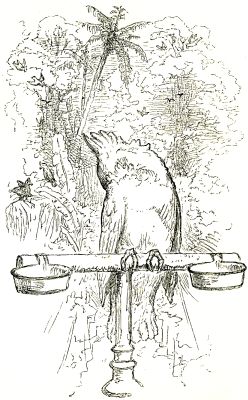 I LIVED AGAIN IN THE FOREST.
I LIVED AGAIN IN THE FOREST.
From that day I might have had a pleasant life, but my malicious temper was destined to bring me much farther trouble. My new master appeared very fond of me, and did much for my comfort. I was allowed the liberty of a fine perch, well provided with clean new feed dishes, but, to my intense mortification and disgust, a chain was put upon my feet. My perch stood near a large window, but heavy curtains prevented me from getting more than a single peep of daylight. I saw my new master only for a short time morning and evening, and the solitude was terrible. I sat alone day after day, believing myself to be slowly dying of sadness. I wished that my life could be one long sleep, for when, my head buried in my feathers, I went to the land of dreams, I lived again in the forest where I was born; I saw once more the noble branches of my native tree, and heard the rushing waters of the mighty river on whose banks it stood; I breathed the perfume of thousands of wild flowers; crowds of brilliant birds came hurrying to comfort me; I saw again my father, my mother, my brother, and my sister; I believed myself free once more. Alas! sorrowful was the awaking from all these delights.
"Are you happy?" my master would say. "Have you eaten your breakfast, Lorito?" Yes, indeed, I had breakfasted. I did nothing but eat breakfast from morning till night. I grew very fat, and what was worse, I became so stupid that I repeated like an echo all my master's words. "Have you eaten your breakfast?" I would scream; and my master would laugh, and toss me a lump of sugar. That was my only recreation—to repeat my master's words and eat sugar. I was gradually losing all sense of honor and truth, and to be praised and get a lump of sugar I would rest my beak in my claw and say, with a languishing air, "My head aches; let me alone." My head did ache, too, sometimes, remembering the days when I knew only the language of my fathers, when the sweet voice of my mother waked me in the morning to pass a happy day playing with my brother and sister. Solitude and confinement had soured my character. The rings of my chain hurt my feet so that they were becoming swelled and inflamed. I hated all the world. When my master filled my feed dish with dainties, instead of gratefully accepting his kindness I would seize the dish and spitefully overturn its contents. All day long I screamed as loud as I could, and it gave me the greatest satisfaction when once a policeman came running in great haste to inquire of the house-maid if there was any trouble. "That horrid parrot!" I heard her say, and I laughed as loud as I had screamed before.
One morning my master entered the dining-room, in the window of which stood my perch, followed by a lady and three beautiful children, who rushed toward me eagerly.
"Be careful, Hope," said her father, as the smallest of the three stretched her little hand toward me; "that fellow bites like a savage."
"Poor Rito, he won't bite me," she said, sweetly; but I know I would have done it then, had not the children's mother astonished me by boldly taking me on her hand. "Poor Lorito," she said. "Look at his feet. They are all red and swelled. Anybody would be cross left all alone on a perch with his feet chained together."
She then gently removed my chain, and called the house-maid to carry the perch, with me upon it, to her sitting-room, and to prepare a dish of wine and sugar to bathe my feet.
When I found myself alone in the sitting-room, and had time to think quietly, I realized that a great change had taken place in the house. Three children had come home, and my solitary days were over. They might tease me, perhaps, but at least they would be company. Another thing too I realized, and that was that for the first time I was free. I looked around the room. It was light and sunny, and I could see that it was filled with various pieces of handsome furniture for which parrots have no use. You may be surprised, but to my mind a branch of a tree in a wild forest is infinitely more beautiful and useful than all the fine furniture in the world.
I began slowly to swing myself down from my perch with the intention of making a close inspection of the room. I am almost sure that at[Pg 23] first I was more curious than malicious, but, alas! I had scarcely started on my voyage of discovery when I perceived a small blue and gilt bowl standing upon the marble hearth. It contained the sweetened wine ordered as a healing bath for my feet. The fragrance was so enticing that, forgetting the good precepts my mother had taught me, I dipped my beak into the bowl and took a long drink, nor did I stop so long as a single drop remained.
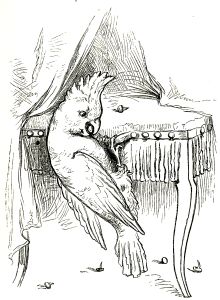 "TEARING OUT NAIL AFTER NAIL."
"TEARING OUT NAIL AFTER NAIL."
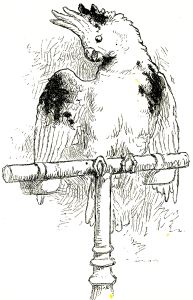 "I WAS BOTH HORRIBLE AND RIDICULOUS."
"I WAS BOTH HORRIBLE AND RIDICULOUS."
No sooner had I swallowed the contents of the bowl than I felt a strange burning sensation in my head, which seemed on the point of dancing away from my body. I was possessed of an intense desire to fight something, and I gazed eagerly around the room in the hope of finding some enemy with whom I could engage in mortal combat. I saw no moving thing in the whole apartment which I could attack, but unfortunately my eyes fell upon some shining brass nails which served as ornaments round the edge of a table. To my heated imagination each nail seemed glaring directly at me, menacing me like the evil eye of a bird of prey. I rushed madly toward the table, and climbing up one of its legs, I seized a nail in my beak. To my great delight I found I could easily pull it out, which I immediately did, and threw it spitefully away. With yells of triumph I crept all around the table, clinging with my claws, and tearing out nail after nail as I went, until every one of those aggravating glaring eyes lay scattered over the carpet.
Although I was victorious in my violent battle with the nails, my spirits were not yet calmed. In looking around for a new victim, I saw a bottle standing upon a table in the centre of the room. The old saying that he who drinks once will drink again is one of the truest of proverbs, and I no sooner discovered the bottle than I made all possible haste to reach it, hoping that it contained more sweetened wine. To be sure, the liquid in the bottle was very dark colored, and had an unpleasant odor, but in my eagerness I paid little attention to those things. I tried to taste it, but the mouth of the bottle was too small for my beak, and all my efforts were in vain. In my rage I vowed revenge, and, screaming loudly, I threw the tantalizing thing with violence to the floor.
Alas! my ill behavior was sadly punished. The bottle I had overturned was filled with ink, and I was spattered from head to foot with the vile black mixture. My beautiful plumage, of which I had been so proud, was ruined. I was both horrible and ridiculous. In this miserable and forlorn condition I climbed back upon my perch, and in a most wretched frame of mind waited to be discovered, and perhaps punished.
A Curious Incident.—Horses will form strong attachments for dogs, but it does not often happen that a horse derives any real benefit from having a canine friend. The following case will show that a dog may sometimes return a horse's affection in a very practical manner. A man living in the country had a horse which happened to be turned out just as his carrots were ready for pulling. He also had a dog that was on the best of terms with the horse. One day he noticed that his carrots were disappearing very fast, but he was almost certain that no one had got in and stolen them. Still he determined to watch, and see who was robbing him. His vigilance was rewarded, for he caught the thief in the very act of pulling up the carrots. Then he cautiously followed him from the garden, and found that he went off in the direction of the field where the horse was. Arrived there, the owner of the carrots saw that his horse was the receiver of his stolen goods. The thief was his dog. In some way the dog had discovered that the horse had a partiality for carrots, and was unable to gratify its taste; but with a sagacity that is almost incredible, the dog found the means of obtaining the succulent morsels for his friend, and this he did without scruple at his master's expense. There was something more than instinct in this dog's head. But any one who takes real notice of the habits and curious doings of animals must inevitably come to the conclusion that the theory is not tenable which maintains that animals can not think and reason.
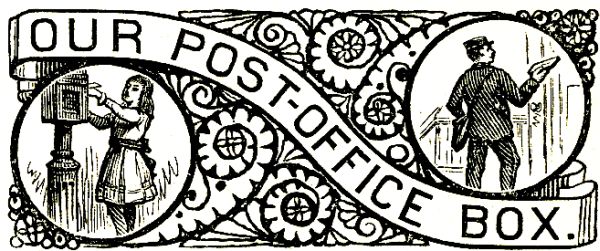
I was very glad when papa brought me the first number of Young People, and told me I should have it every week. When I read the story of Watty Hirzel, the brave Swiss boy, it made me think of a boy I saw last summer in the Tyrol, where I went with papa and mamma. He was helping his father row a boat on the Königs-See, a beautiful lake in the Bavarian Tyrol. I remember him because he had a bunch of Alpine roses and Edelweiss, which he gave to mamma. We had never seen any flowers like them before, and we wondered if there was any pretty English name for the Edelweiss. Mamma thinks that perhaps if I ask Young People I shall find out. It is a white flower, with leaves like velvet, and the little boatman said it grew very high up on the mountains, where the chamois live.
Mamie.
We do not know any pretty English name for Edelweiss. The German name is composed of two words—edel, signifying noble, and weiss, white. If you are studying botany, perhaps you can determine to what family the flower belongs—that is, if you have any carefully pressed specimens.
Will you please tell me why the Bank of England is called "the Old Lady in Threadneedle Street," and who first called it so? I would like to know, too, when the bank was founded, and when the building it now occupies was erected.
Inquisitive Jim.
Will not some of our "young people" send answers to "Jim's" questions?
The picture of Chestnutting in the first number of Young People puts me in mind of our beechnutting parties. On the hill where my papa's house stands there are a large number of beech-trees, and I and my two little brothers have just had a fine frolic gathering the queer three-sided little nuts. A beech forest is very beautiful in autumn, when the golden leaves are fluttering down to the ground, and the smooth, straight tree trunks tower upward like silver-gray giants. When we gathered the nuts we spread some old sheets and blankets under the tree, because the nuts are so very small that otherwise we would never have been able to find them among the heaps of dry leaves. They are nestled in russet-brown burrs, something like chestnuts, and are so abundant that sometimes we get a whole barrelful from one tree. We like them better than chestnuts, and they keep all winter. My brothers and myself always take a pocketful to school to eat with our luncheon. We often find them in the spring among the heaps of last year's leaves, and after they have lain under the snow all winter, they begin to sprout when the first warm days come, and then they are very nice to eat.
I hope the Young People will tell us of some good winter-evening games, for we never know what to do between supper and bed-time. We always learn our lessons for the next day in the afternoon.
Susie H. C.
We were scattered about our sitting-room table; the early tea was just over, and a good long evening before us. (Us means papa, Bob, Mamie, and Nelly. I am Nelly, and the eldest of the family—except papa, of course.)
Papa was reading the evening paper—something about stocks, I suppose; Bob had both elbows firmly planted within two inches of the student-lamp, handy for upsetting in case he sneezed; Mamie was looking as doleful as if she had lost her kitten; and I was gazing in the fire and dreaming.
"Wish I had something to do," yawned Bob.
"So do I," said Mamie.
"Play checkers," I suggested.
"No; only two can play that," objected Mamie. "Papa, don't you know something we can play?"
"Well," said papa, folding up his paper, "let me see. Bob, take yourself out of the lamp. Play 'Recondite Forms.'"
"What's recondite?" growled Bob.
"Recondite means hidden, concealed, and this game is called 'Recondite Forms' because— But you will understand it better after you have played it. I want pencils and some rather thin paper."
Bob and Mamie collected the pencils, I brought a supply of French note-paper from my desk, and we all drew our chairs about the table, ready for work.
Papa took a pencil, and made a kind of wiggle, like No. 1 in the picture; then he laid over that another sheet of paper, which was thin enough to allow the pencil mark to show through; this he carefully traced, so as to have an exact copy, and did the same with two other sheets; then gave us each one, and told us to see what kind of a picture we could make out of it; we might add to the line as much as we pleased, but we must not alter nor cross it.
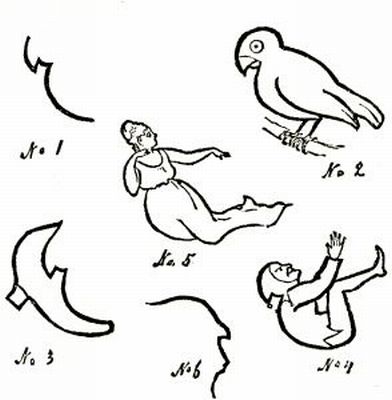
"Oh," said Bob, "I don't know what to make!"
"Hush!" said Mamie; "I want to think."
Then silence reigned—at first puzzled, but afterward busy.
"I've got it!" shouted Bob, dropping his pencil.
"So've I," echoed Mamie.
"Now for a grand exhibition!" said papa, collecting the papers, and laying them in a row on the table.
Bob had made a parrot out of his "wiggle," papa a graceful floating figure, Mamie a high-heeled shoe, and I a fool with cap and bells.
"Now," said papa, "do you see why this is called 'Recondite Forms'? In this first line all the other figures were hidden, and it took only a few pencil strokes to bring them out."
"Yes, I see," said Bob. "Now let's try some more wiggles."
"Wiggles!" said papa; "I don't know but that's a better name than the other."
"Oh yes; re-con-dite is awful hard," said Mamie.
"Wiggles it is, then," said papa.
And "wiggles" it has been ever since. I will add, for the benefit of those outside my own small circle, that instead of French note-paper, the common white wrapping-paper, such as grocers use in tying up parcels of tea, is just as good for the purpose, and a great deal cheaper. With several sheets of this, and two or three lead-pencils, "wiggles" may be played for a whole evening.
In the picture No. 6 is a new "wiggle" for you to try your hand upon. See what you can make of it, and in the next number I will give you my idea.
Hats.—The felt hat is as old as Homer. The Greeks made them in skull-caps, conical, truncated, narrow, or broad-brimmed. The Phrygian bonnet was an elevated cap without a brim, the apex turned over in front. It is known as the cap of Liberty. An ancient figure of Liberty in the times of Antonius Livius, a.d. 115, holds the cap in the right hand. The Persians wore soft caps; plumed hats were the head-dress of the Syrian corps of Xerxes; the broad-brim was worn by the Macedonian kings. Castor means a beaver. The Armenian captive wore a plug hat. The merchants of the fourteenth century wore a Flanders beaver. Charles VII., in 1469, wore a felt hat lined with red, and plumed. The English men and women in 1510 wore close woollen or knitted caps; two centuries ago hats were worn in the house. Pepys, in his diary, wrote: "September, 1664, got a severe cold because he took off his hat at dinner;" and again, in January, 1665, he got another cold by sitting too long with his head bare, to allow his wife's maid to comb his hair and wash his ears; and Lord Clarendon, in his essay, speaking of the decay of respect due the aged, says "that in his younger days he never kept his hat on before those older than himself, except at dinner." In the thirteenth century Pope Innocent IV. allowed the cardinals the use of the scarlet cloth hat. The hats now in use are the cloth hat, leather hat, paper hat, silk hat, opera hat, spring-brim hat, and straw hat.
Sponges.—The coarse, soft, flat sponges, with large pores and great orifices in them, come from the Bahamas and Florida. The finer kinds, suitable for toilet use, are found in the Levant; the best on the coast of Northern Syria, near Tripoli, and secondary qualities among the Greek isles. These are either globular or of a cup-like form, with fine pores, and are not easily torn. They are got by divers plunging from a boat, many fathoms down, with a heavy stone tied to a rope for sinking the man, who snatches the sponges, puts them into a net fastened to his waist, and is then hauled up. Some of the Greeks, instead of diving, throw short harpoons attached to a cord, having first spied their prey at the bottom through a tin tube with a glass bottom immersed below the surface waves.
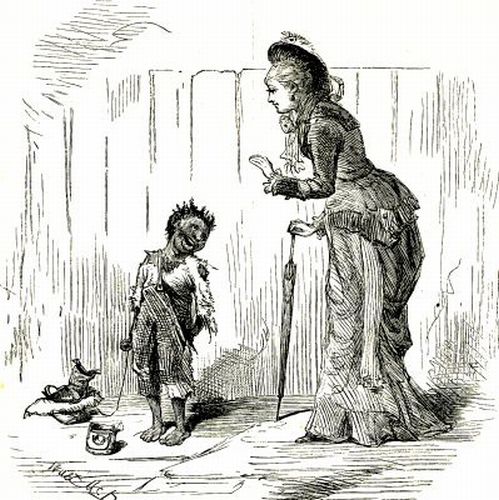
Lady (with an eye for the picturesque). "How old are you, little boy?"
Little Darky. "Well, if you goes by wot mudder says, I's six; but if you goes by de fun I's had, I's most a hunderd."
A brilliant serial story by George MacDonald, with illustrations by Alfred Fredericks, will shortly be begun in Harper's Young People.
Harper's Young People will be issued every Tuesday, and may be had at the following rates:
Four cents a number.
Single subscriptions for one year, $1.50; five subscriptions, one year, $7.00: payable in advance. Postage free.
Subscriptions may begin with any number. When no time is specified, it will be understood that the subscriber desires to commence with the number issued after the receipt of order.
Remittances should be made by Post-office Money Order, or Draft, to avoid risk of loss.
Published by HARPER & BROTHERS, New York.
☞ Harper's Young People and Harper's Weekly will be sent to any address for one year, commencing with the first number of Harper's Weekly, for January, 1880, on receipt of $5.00 for the two Periodicals.
End of the Project Gutenberg EBook of Harper's Young People, November 18,
1879, by Various
*** END OF THIS PROJECT GUTENBERG EBOOK HARPER'S YOUNG PEOPLE, NOV 18, 1879 ***
***** This file should be named 28196-h.htm or 28196-h.zip *****
This and all associated files of various formats will be found in:
https://www.gutenberg.org/2/8/1/9/28196/
Produced by Annie McGuire
Updated editions will replace the previous one--the old editions
will be renamed.
Creating the works from public domain print editions means that no
one owns a United States copyright in these works, so the Foundation
(and you!) can copy and distribute it in the United States without
permission and without paying copyright royalties. Special rules,
set forth in the General Terms of Use part of this license, apply to
copying and distributing Project Gutenberg-tm electronic works to
protect the PROJECT GUTENBERG-tm concept and trademark. Project
Gutenberg is a registered trademark, and may not be used if you
charge for the eBooks, unless you receive specific permission. If you
do not charge anything for copies of this eBook, complying with the
rules is very easy. You may use this eBook for nearly any purpose
such as creation of derivative works, reports, performances and
research. They may be modified and printed and given away--you may do
practically ANYTHING with public domain eBooks. Redistribution is
subject to the trademark license, especially commercial
redistribution.
*** START: FULL LICENSE ***
THE FULL PROJECT GUTENBERG LICENSE
PLEASE READ THIS BEFORE YOU DISTRIBUTE OR USE THIS WORK
To protect the Project Gutenberg-tm mission of promoting the free
distribution of electronic works, by using or distributing this work
(or any other work associated in any way with the phrase "Project
Gutenberg"), you agree to comply with all the terms of the Full Project
Gutenberg-tm License (available with this file or online at
https://gutenberg.org/license).
Section 1. General Terms of Use and Redistributing Project Gutenberg-tm
electronic works
1.A. By reading or using any part of this Project Gutenberg-tm
electronic work, you indicate that you have read, understand, agree to
and accept all the terms of this license and intellectual property
(trademark/copyright) agreement. If you do not agree to abide by all
the terms of this agreement, you must cease using and return or destroy
all copies of Project Gutenberg-tm electronic works in your possession.
If you paid a fee for obtaining a copy of or access to a Project
Gutenberg-tm electronic work and you do not agree to be bound by the
terms of this agreement, you may obtain a refund from the person or
entity to whom you paid the fee as set forth in paragraph 1.E.8.
1.B. "Project Gutenberg" is a registered trademark. It may only be
used on or associated in any way with an electronic work by people who
agree to be bound by the terms of this agreement. There are a few
things that you can do with most Project Gutenberg-tm electronic works
even without complying with the full terms of this agreement. See
paragraph 1.C below. There are a lot of things you can do with Project
Gutenberg-tm electronic works if you follow the terms of this agreement
and help preserve free future access to Project Gutenberg-tm electronic
works. See paragraph 1.E below.
1.C. The Project Gutenberg Literary Archive Foundation ("the Foundation"
or PGLAF), owns a compilation copyright in the collection of Project
Gutenberg-tm electronic works. Nearly all the individual works in the
collection are in the public domain in the United States. If an
individual work is in the public domain in the United States and you are
located in the United States, we do not claim a right to prevent you from
copying, distributing, performing, displaying or creating derivative
works based on the work as long as all references to Project Gutenberg
are removed. Of course, we hope that you will support the Project
Gutenberg-tm mission of promoting free access to electronic works by
freely sharing Project Gutenberg-tm works in compliance with the terms of
this agreement for keeping the Project Gutenberg-tm name associated with
the work. You can easily comply with the terms of this agreement by
keeping this work in the same format with its attached full Project
Gutenberg-tm License when you share it without charge with others.
1.D. The copyright laws of the place where you are located also govern
what you can do with this work. Copyright laws in most countries are in
a constant state of change. If you are outside the United States, check
the laws of your country in addition to the terms of this agreement
before downloading, copying, displaying, performing, distributing or
creating derivative works based on this work or any other Project
Gutenberg-tm work. The Foundation makes no representations concerning
the copyright status of any work in any country outside the United
States.
1.E. Unless you have removed all references to Project Gutenberg:
1.E.1. The following sentence, with active links to, or other immediate
access to, the full Project Gutenberg-tm License must appear prominently
whenever any copy of a Project Gutenberg-tm work (any work on which the
phrase "Project Gutenberg" appears, or with which the phrase "Project
Gutenberg" is associated) is accessed, displayed, performed, viewed,
copied or distributed:
This eBook is for the use of anyone anywhere at no cost and with
almost no restrictions whatsoever. You may copy it, give it away or
re-use it under the terms of the Project Gutenberg License included
with this eBook or online at www.gutenberg.org
1.E.2. If an individual Project Gutenberg-tm electronic work is derived
from the public domain (does not contain a notice indicating that it is
posted with permission of the copyright holder), the work can be copied
and distributed to anyone in the United States without paying any fees
or charges. If you are redistributing or providing access to a work
with the phrase "Project Gutenberg" associated with or appearing on the
work, you must comply either with the requirements of paragraphs 1.E.1
through 1.E.7 or obtain permission for the use of the work and the
Project Gutenberg-tm trademark as set forth in paragraphs 1.E.8 or
1.E.9.
1.E.3. If an individual Project Gutenberg-tm electronic work is posted
with the permission of the copyright holder, your use and distribution
must comply with both paragraphs 1.E.1 through 1.E.7 and any additional
terms imposed by the copyright holder. Additional terms will be linked
to the Project Gutenberg-tm License for all works posted with the
permission of the copyright holder found at the beginning of this work.
1.E.4. Do not unlink or detach or remove the full Project Gutenberg-tm
License terms from this work, or any files containing a part of this
work or any other work associated with Project Gutenberg-tm.
1.E.5. Do not copy, display, perform, distribute or redistribute this
electronic work, or any part of this electronic work, without
prominently displaying the sentence set forth in paragraph 1.E.1 with
active links or immediate access to the full terms of the Project
Gutenberg-tm License.
1.E.6. You may convert to and distribute this work in any binary,
compressed, marked up, nonproprietary or proprietary form, including any
word processing or hypertext form. However, if you provide access to or
distribute copies of a Project Gutenberg-tm work in a format other than
"Plain Vanilla ASCII" or other format used in the official version
posted on the official Project Gutenberg-tm web site (www.gutenberg.org),
you must, at no additional cost, fee or expense to the user, provide a
copy, a means of exporting a copy, or a means of obtaining a copy upon
request, of the work in its original "Plain Vanilla ASCII" or other
form. Any alternate format must include the full Project Gutenberg-tm
License as specified in paragraph 1.E.1.
1.E.7. Do not charge a fee for access to, viewing, displaying,
performing, copying or distributing any Project Gutenberg-tm works
unless you comply with paragraph 1.E.8 or 1.E.9.
1.E.8. You may charge a reasonable fee for copies of or providing
access to or distributing Project Gutenberg-tm electronic works provided
that
- You pay a royalty fee of 20% of the gross profits you derive from
the use of Project Gutenberg-tm works calculated using the method
you already use to calculate your applicable taxes. The fee is
owed to the owner of the Project Gutenberg-tm trademark, but he
has agreed to donate royalties under this paragraph to the
Project Gutenberg Literary Archive Foundation. Royalty payments
must be paid within 60 days following each date on which you
prepare (or are legally required to prepare) your periodic tax
returns. Royalty payments should be clearly marked as such and
sent to the Project Gutenberg Literary Archive Foundation at the
address specified in Section 4, "Information about donations to
the Project Gutenberg Literary Archive Foundation."
- You provide a full refund of any money paid by a user who notifies
you in writing (or by e-mail) within 30 days of receipt that s/he
does not agree to the terms of the full Project Gutenberg-tm
License. You must require such a user to return or
destroy all copies of the works possessed in a physical medium
and discontinue all use of and all access to other copies of
Project Gutenberg-tm works.
- You provide, in accordance with paragraph 1.F.3, a full refund of any
money paid for a work or a replacement copy, if a defect in the
electronic work is discovered and reported to you within 90 days
of receipt of the work.
- You comply with all other terms of this agreement for free
distribution of Project Gutenberg-tm works.
1.E.9. If you wish to charge a fee or distribute a Project Gutenberg-tm
electronic work or group of works on different terms than are set
forth in this agreement, you must obtain permission in writing from
both the Project Gutenberg Literary Archive Foundation and Michael
Hart, the owner of the Project Gutenberg-tm trademark. Contact the
Foundation as set forth in Section 3 below.
1.F.
1.F.1. Project Gutenberg volunteers and employees expend considerable
effort to identify, do copyright research on, transcribe and proofread
public domain works in creating the Project Gutenberg-tm
collection. Despite these efforts, Project Gutenberg-tm electronic
works, and the medium on which they may be stored, may contain
"Defects," such as, but not limited to, incomplete, inaccurate or
corrupt data, transcription errors, a copyright or other intellectual
property infringement, a defective or damaged disk or other medium, a
computer virus, or computer codes that damage or cannot be read by
your equipment.
1.F.2. LIMITED WARRANTY, DISCLAIMER OF DAMAGES - Except for the "Right
of Replacement or Refund" described in paragraph 1.F.3, the Project
Gutenberg Literary Archive Foundation, the owner of the Project
Gutenberg-tm trademark, and any other party distributing a Project
Gutenberg-tm electronic work under this agreement, disclaim all
liability to you for damages, costs and expenses, including legal
fees. YOU AGREE THAT YOU HAVE NO REMEDIES FOR NEGLIGENCE, STRICT
LIABILITY, BREACH OF WARRANTY OR BREACH OF CONTRACT EXCEPT THOSE
PROVIDED IN PARAGRAPH F3. YOU AGREE THAT THE FOUNDATION, THE
TRADEMARK OWNER, AND ANY DISTRIBUTOR UNDER THIS AGREEMENT WILL NOT BE
LIABLE TO YOU FOR ACTUAL, DIRECT, INDIRECT, CONSEQUENTIAL, PUNITIVE OR
INCIDENTAL DAMAGES EVEN IF YOU GIVE NOTICE OF THE POSSIBILITY OF SUCH
DAMAGE.
1.F.3. LIMITED RIGHT OF REPLACEMENT OR REFUND - If you discover a
defect in this electronic work within 90 days of receiving it, you can
receive a refund of the money (if any) you paid for it by sending a
written explanation to the person you received the work from. If you
received the work on a physical medium, you must return the medium with
your written explanation. The person or entity that provided you with
the defective work may elect to provide a replacement copy in lieu of a
refund. If you received the work electronically, the person or entity
providing it to you may choose to give you a second opportunity to
receive the work electronically in lieu of a refund. If the second copy
is also defective, you may demand a refund in writing without further
opportunities to fix the problem.
1.F.4. Except for the limited right of replacement or refund set forth
in paragraph 1.F.3, this work is provided to you 'AS-IS' WITH NO OTHER
WARRANTIES OF ANY KIND, EXPRESS OR IMPLIED, INCLUDING BUT NOT LIMITED TO
WARRANTIES OF MERCHANTIBILITY OR FITNESS FOR ANY PURPOSE.
1.F.5. Some states do not allow disclaimers of certain implied
warranties or the exclusion or limitation of certain types of damages.
If any disclaimer or limitation set forth in this agreement violates the
law of the state applicable to this agreement, the agreement shall be
interpreted to make the maximum disclaimer or limitation permitted by
the applicable state law. The invalidity or unenforceability of any
provision of this agreement shall not void the remaining provisions.
1.F.6. INDEMNITY - You agree to indemnify and hold the Foundation, the
trademark owner, any agent or employee of the Foundation, anyone
providing copies of Project Gutenberg-tm electronic works in accordance
with this agreement, and any volunteers associated with the production,
promotion and distribution of Project Gutenberg-tm electronic works,
harmless from all liability, costs and expenses, including legal fees,
that arise directly or indirectly from any of the following which you do
or cause to occur: (a) distribution of this or any Project Gutenberg-tm
work, (b) alteration, modification, or additions or deletions to any
Project Gutenberg-tm work, and (c) any Defect you cause.
Section 2. Information about the Mission of Project Gutenberg-tm
Project Gutenberg-tm is synonymous with the free distribution of
electronic works in formats readable by the widest variety of computers
including obsolete, old, middle-aged and new computers. It exists
because of the efforts of hundreds of volunteers and donations from
people in all walks of life.
Volunteers and financial support to provide volunteers with the
assistance they need are critical to reaching Project Gutenberg-tm's
goals and ensuring that the Project Gutenberg-tm collection will
remain freely available for generations to come. In 2001, the Project
Gutenberg Literary Archive Foundation was created to provide a secure
and permanent future for Project Gutenberg-tm and future generations.
To learn more about the Project Gutenberg Literary Archive Foundation
and how your efforts and donations can help, see Sections 3 and 4
and the Foundation web page at https://www.pglaf.org.
Section 3. Information about the Project Gutenberg Literary Archive
Foundation
The Project Gutenberg Literary Archive Foundation is a non profit
501(c)(3) educational corporation organized under the laws of the
state of Mississippi and granted tax exempt status by the Internal
Revenue Service. The Foundation's EIN or federal tax identification
number is 64-6221541. Its 501(c)(3) letter is posted at
https://pglaf.org/fundraising. Contributions to the Project Gutenberg
Literary Archive Foundation are tax deductible to the full extent
permitted by U.S. federal laws and your state's laws.
The Foundation's principal office is located at 4557 Melan Dr. S.
Fairbanks, AK, 99712., but its volunteers and employees are scattered
throughout numerous locations. Its business office is located at
809 North 1500 West, Salt Lake City, UT 84116, (801) 596-1887, email
business@pglaf.org. Email contact links and up to date contact
information can be found at the Foundation's web site and official
page at https://pglaf.org
For additional contact information:
Dr. Gregory B. Newby
Chief Executive and Director
gbnewby@pglaf.org
Section 4. Information about Donations to the Project Gutenberg
Literary Archive Foundation
Project Gutenberg-tm depends upon and cannot survive without wide
spread public support and donations to carry out its mission of
increasing the number of public domain and licensed works that can be
freely distributed in machine readable form accessible by the widest
array of equipment including outdated equipment. Many small donations
($1 to $5,000) are particularly important to maintaining tax exempt
status with the IRS.
The Foundation is committed to complying with the laws regulating
charities and charitable donations in all 50 states of the United
States. Compliance requirements are not uniform and it takes a
considerable effort, much paperwork and many fees to meet and keep up
with these requirements. We do not solicit donations in locations
where we have not received written confirmation of compliance. To
SEND DONATIONS or determine the status of compliance for any
particular state visit https://pglaf.org
While we cannot and do not solicit contributions from states where we
have not met the solicitation requirements, we know of no prohibition
against accepting unsolicited donations from donors in such states who
approach us with offers to donate.
International donations are gratefully accepted, but we cannot make
any statements concerning tax treatment of donations received from
outside the United States. U.S. laws alone swamp our small staff.
Please check the Project Gutenberg Web pages for current donation
methods and addresses. Donations are accepted in a number of other
ways including including checks, online payments and credit card
donations. To donate, please visit: https://pglaf.org/donate
Section 5. General Information About Project Gutenberg-tm electronic
works.
Professor Michael S. Hart was the originator of the Project Gutenberg-tm
concept of a library of electronic works that could be freely shared
with anyone. For thirty years, he produced and distributed Project
Gutenberg-tm eBooks with only a loose network of volunteer support.
Project Gutenberg-tm eBooks are often created from several printed
editions, all of which are confirmed as Public Domain in the U.S.
unless a copyright notice is included. Thus, we do not necessarily
keep eBooks in compliance with any particular paper edition.
Most people start at our Web site which has the main PG search facility:
https://www.gutenberg.org
This Web site includes information about Project Gutenberg-tm,
including how to make donations to the Project Gutenberg Literary
Archive Foundation, how to help produce our new eBooks, and how to
subscribe to our email newsletter to hear about new eBooks.